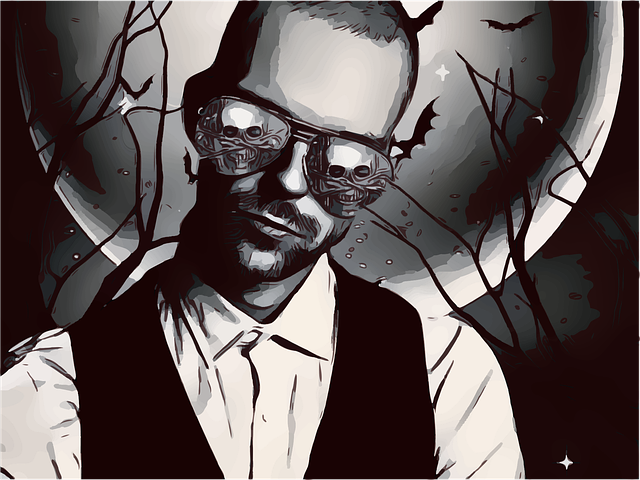 Submitted by Mr. Jones on
Submitted by Mr. Jones on

Image by prettysleepy1 from http://Pixabay.com
Usually, the locations of most serial murders are demolished, primarily to prevent ghoulish visitors from turning them into a makeshift shrine. Fox Hollow Farm, a sprawling 18-acre property located in Indiana, is a rare exception, however. Because it is privately owned, and also a family residence, Fox Hollow still exists today in a condition very much akin to that at the time of the murders.
Serial killer Herb Baumeister (subsequently dubbed, "The I-70 Strangler," after a string of murders that took place along the interstate highway) was never convicted of the crimes, yet detectives believe that he was responsible for anywhere between 17 and 30 deaths, most of which took place in the swimming pool at Fox Hollow Farm. The bodies of Baumeister's victims were dragged into the woods behind the house and then dismembered, burned, and left to the elements. Once the authorities got wind of the murders, Baumeister fled the country, crossing the border into Canada, where he took his own life on a remote beach, shooting himself in the head with a revolver.
Given its tragic and macabre history, it is small wonder that Fox Hollow Farm should be haunted. When the opportunity arose for me, a paranormal investigator and writer, to investigate the farm and try to get to the root of the haunting, I jumped at the opportunity. Over the space of several days and nights, my team of researchers and a number of visiting psychic mediums attempted to gather evidence to either support or debunk the claims of strange goings-on at the farm. What we found during the course of our stay was nothing short of mind-boggling. After returning home from Fox Hollow Farm for what I hope is the last time, I was surprised to discover that a number of other locations that are connected with serial murder are still standing...and many of them come with associated ghost stories. Let's take a look at two that I have personally investigated.
The Villisca Ax Murder House
Sometime on the evening of June 9 or in the early morning hours of June 10, 1912, an unidentified individual (some believe there may have been two, though that has never been proven) broke into the home of J.B. Moore and his family in the small town of Villisca, Iowa. The family of six (two adults, four children) plus two children who were friends of the family, had spent the evening at the town Presbyterian church, returning a little before ten o'clock and then retiring to their beds.
The killer had been lurking in the cramped attic, waiting for them to fall asleep. He then emerged from hiding, brandishing the axe that Mr. Moore used for chopping wood. As the man of the house, Mr. Moore was the most capable of defending himself—and therefore, the greatest threat. The killer targeted him first, using the sharp blade of his own axe to cleave his skull. Mr. Moore was the only victim to receive the sharp end. The killer next turned his attention to Sarah Moore, bludgeoning her to death with the flat head of the axe. He then into the room next door, shared by the four Moore children, and did the same thing to them.
All six of the Moores had been murdered in their sleep, which was most likely a mercy. The killer then descended the steep, narrow staircase to the ground floor. Stepping out into the kitchen, he turned right into the living room, then headed into the back bedroom, where Ina Stillinger (just eight years old) and her twelve-year-old sister Lena had been sleeping, and took the axe to them. He then covered every mirror, window, and reflective surface in the house with cloth, washed the blood from his hands, and sat down to eat, before finally disappearing into the night.
The massacre scarred the town of Villisca permanently. For months after the murders, multiple families would get together at night and sleep under the watchful eye of fathers and husbands, who took turns sitting up through the night with rifles and shotguns at the ready, in case the killer should strike again.
He never did...at least, not in Villisca.
With hindsight, it appears as though the killer may have murdered families in other towns across the country, in states such as Colorado and Kansas. Although there are a number of theories as to his identity, he was never caught.
I have visited the Moore House (now known as the Villisca Ax Murder House) myself on two occasions. Even today, over one hundred years after the murders occurred, it is a melancholy and haunted place. Something about the atmosphere inside the home is heavy and oppressive, almost as if the house is holding its breath. The wood-frame structure is surprisingly small, particularly the attic, in which the killer is believed to have hid (cigarette butts were subsequently found in there) and lain in wait for his victims to fall asleep.
Walking in through the back door into the kitchen and climbing the dark staircase up to the master bedroom, it is chills the blood to realize that you are following in the footsteps of a killer. The imagination does not have to work particularly hard to conjure up images of the axe-wielding psychopath, making his way from room to room, his hands and forearms covered in blood.
I stood next to J.B. and Sarah Moore's bed, offering up a silent prayer of condolence, and happened to glance up at the wall above the dresser. There, several gouges have been taken out of the plasterwork, caused by the backswing of the axe as the killer went about his bloody business.
When darkness falls, the entire character of the house changes. The atmosphere takes on a distinctly unfriendly vibe. My team and I encountered what sounded like footsteps on the floorboards of empty rooms (or was it simply the house settling after a long, hot day?) and were bemused to find that our LED flashlights would switch themselves off and back on again upon request. Perhaps most disturbing of all, I recorded the sound of a child giggling when I made a mistake while operating a piece of equipment.
So, who—or more worryingly, what—haunts the Villisca Ax Murder House? Some believe it to be the spirits of the Moore family, though I do not think so myself; others, that the spirit of the killer has returned there, which makes little sense when one considers the fact that he only visited the place once, and most certainly did not die in the house. A third school of thought claims that some kind of dark, malevolent entity has taken up residency there, perhaps drawn by the horrific event that took place inside the house.
The expert on this particular case, caretaker of the home and paranormal investigator Johnny Houser, has an entirely different theory. He believes that the house is haunting itself. In other words, all the countless visits by tourists and investigators over the years have provided an almost limitless source of energy for spirit entities to feed from. Spirit board sessions were regularly conducted inside the house some twenty years after the murders took place, back when Spiritualism was all the rage, and Johnny believes that the Moore home has, for all intents and purposes, truly taken on a life of its own.
The R Theater
With a lifelong love of the movies, Robbin Terry's dream came true when he purchased an old movie theater in the town of Auburn, Illinois. A skilled handyman, Robbin wasted no time in fixing the old place up. It had seen better days, and needed quite a lot of TLC. He and his wife converted the upstairs, including what had once been the projection booth, into their primary residence.
Not long after moving in, the Terrys began to experience strange phenomena: voices in the empty building, shadows apparently moving by themselves, and footsteps heard crossing vacant rooms and hallways.
Robbin wasted no time in bringing in a psychic, who told him that a man by the name of John Wayne was haunting his new home. He was initially elated—it made total sense that John Wayne, "the Duke" himself, would be resident at a movie theater where hundreds of Westerns had been screened over the years. But things weren't as simple as they seemed at first. Why, the psychic wondered, was she getting images of a man dressed as a clown?
A second psychic reported something very similar: a laughing, cackling clown. Intrigued, Robbin took some time to think about it. He had recently come into the possession of a wooden armoire that was once owned by the attorney for none other than John Wayne...Gacy.
Gacy, one of the most vicious and prolific serial killers on record, had preyed upon young men in the Chicago area, until he was finally caught and sentenced to death by lethal injection in 1994. Gacy had an alter-ego, dressing as a clown named Pogo, in whose guise he attended childrens' birthday parties and charity fundraiser events.
During his incarceration on Death Row, Gacy had spent some of his time painting. Many of those portraits, childish and sinister, were sold to private collectors. Several of them were stored inside the armoire, which gave Gacy a definite connection to it. Texas-based paranormal investigators Brad and Barry Klinge (of the TV show Ghost Lab) conducted their own investigation at the R Theater, and swiftly concluded that the spirit of the notorious serial killer was indeed active at that location. After the Klinges taunted and EVP (Electronic Voice Phenomena) promising, "I'll show you one..."
I spent the better part of a week investigating the R Theater with my own team. During that time we experienced a number of bizarre occurrences: strange light phenomena in blacked-out rooms, shadows moving in the stairwell and the hallway outside the main auditorium. Then, finally, the following exchange happened during an EVP experiment conducted in front of the screen:
My teammate Anna was blindfolded and sitting with a pair of noise-canceling headphones on, in order to minimize the possibility of external sensory stimuli. The headphones were plugged into a "spirit box," another name for a frequency-hopping radio scanner that, some believe, may be used as a means of communicating with disembodied entities. The listener can only hear the output from the box, and nothing else besides. Her job is to call out what she thinks she's hearing, so that her fellow investigators can ask further questions.
"Somebody's coming."
"Who's coming, Anna?" I asked.
"John."
We all looked at one another with raised eyebrows.
"Where's John coming from?"
"From Hell."
I'm not a big believer in coincidence, though I suppose it's possible that that is all this was. Nevertheless, this communication made the hair stand up on the back of my neck. If the stories are to be believed, then twenty-five years after his death, John Wayne Gacy may still be prowling the hallways of an old theater in Illinois.
The world truly is stranger than we can possibly imagine.
Richard Estep
https://www.llewellyn.com/journal/article/2770
Copyright © 09-23-2019 - Llewellyn Worldwide, Ltd.
- 510 reads